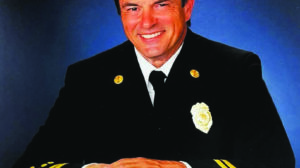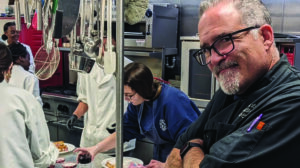Some believe that home-schooled children are isolated or miss out on activities akin to traditional schools. But it’s not true, said Larry Sparks, coach for the new Falcon area home-school debate team.There are many programs – local and national – that sponsor and promote programs for home-schooled children in communities throughout the country. The Falcon area debate team – named Resolve – is affiliated with the National Christian Forensics and Communication Association (NCFCA), and 48 home-schooled students participate, meeting at the Falcon Baptist Church to practice their debating skills.According to the American Heritage Dictionary, forensics is defined as “the art or study of formal debate.”According to its Web site, the NCFCA “believes that formal speech and debate can provide a means for home schooled students to learn and exercise analytical and oratorical skills, addressing life issues from a Biblical world view in a manner that glorifies God.””We’re in our 11th year now, and there are 5,000 affiliate families nationwide and 350 affiliate families in Colorado,” Sparks said. “We’re the third-largest high school forensics league in the country.”Students aged 12 to 18 years are eligible to join. Younger students can participate in the Junior Speech program. The high school age students practice one-on-one debates, known as Lincoln Douglas debates, and policy debates, where two-person teams debate each other.Ken Gray’s oldest daughter debated for four years, and his youngest daughter is a Lincoln Douglas debater. He said each debater has to be prepared to debate both sides of an issue. “They don’t know which side until just before the debate begins,” Gray said.Lincoln Douglas debaters argue a values proposition. Sparks said it’s about “whether we should pursue a certain action because of a value that underlies it or not pursue an action because of a different value. It’s not necessarily right versus wrong, but which value shall we uphold?” This year, the Lincoln Douglas debate topic is about isolationism related to the United States – should Americans place a higher value on isolationism?Policy debaters typically debate a national policy problem, Sparks said. This year’s policy of debate involves illegal immigration. Should the U.S. government substantially change its policy on illegal immigration? With that kind of topic, Sparks said, debaters on the affirmative side will first try to confirm that there is a problem with illegal immigration and then determine if the federal government policy is part of the problem and if changing the policy is necessary to improve the situation. Debaters on the other side will argue that the policy should not be changed, Sparks said.At the Sept. 20 Resolve meeting, first-year debater Alexandra Navarro was nervous when she practiced a portion of her policy debate on illegal immigration for the first time.Navarro said she joined Resolve to “defend” what she believes. “I wanted to be able to debate stuff like abortion and homosexuality and give my point of view to see if it would help the government,” she said. “The government hasn’t done much to prevent illegal immigration.”Navarro argued during the debate on illegal immigration that the government’s policy should be changed because illegal immigrants bring diseases that had been eradicated, such as tuberculosis, into the country. Illegal immigrants also make up a large part of the prison population, she said. Sparks encouraged Navarro to check her facts on illegal immigrants in the prison population at the U.S. Department of Justice Web site.Melanie Whitcombe didn’t like debating, until she witnessed her sister doing well and getting noticed, so Whitcombe decided to try it. “It’s so much fun,” she said. “You get to meet all these people. You can talk logically to people.”Fourteen-year old Rachel Seay joined for a different reason. “I want to be a home-schooling mother,” she said. “It [debate] will help me come alongside my husband. Using the logic and speaking skills will help him.”Rachel’s mother, Renee Seay, said she encouraged the oldest two of her five children to become involved with debate when they lived in Virginia. “You could see the difference between kids that studied debate and those that didn’t,” Seay said. She said she is impressed with the way they think through adult issues and can carry on a conversation with adults.Another Resolve member, David Diaso Jr., said he quit the debate team because at first he didn’t like it. But he rejoined. “I want to be a pastor,” he said. “Debate helps you think on your feet. It makes you have to research and know stuff.””I love arguing and I hate arguing,” said Jeshua Kracht. “I love cross examination. I like to ask the questions.”Gray said debate teaches kids to objectively look at both sides of an issue. In other leagues, he said school rivalries can lead to animosity. But Gray said the NCFCA members shake hands, hug and encourage each other before the debate. While they vehemently argue during the debate, they compliment each other after the debate, he said.Resolve members will participate in their first scrimmage of the year Oct. 18 in Littleton, Colo., with the Credo club, Sparks said. “We’ll be debating both styles with their kids. It will be our kids’ first opportunity to try out their cases and their evidence.”Many tournaments are scheduled throughout the year, he said.”Based on your performance in the tournaments, you may qualify for an invitational spot at the regional tournament,” Sparks said. “Out of the regional tournament, the regions have slots for the national tournament.”The team that comes in first at the nationals can win scholarship money, so there is an incentive to do well. But I try to stress on the kids that the most important thing you can do at debate is learn how to think critically.”Sparks said tests conducted by the American College Testing Service (ACT) have shown that journalism courses and forensics stood out as two activities that best equipped students for success.”Whether home school or public school, debaters rise to the top of industry,” Sparks said. “Many CEOs and members of Congress have been debaters. Practically every attorney has been a debater, so there are definite academic benefits. It makes you happier in your life. You live a better life. You live an examined life.”For more information on the Resolve debate club, contact Larry Sparks at 243-0935. For information on the NCFCA, visit www.ncfca.org.






